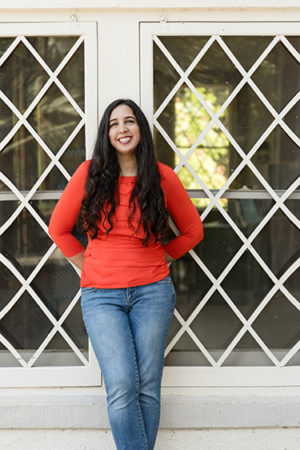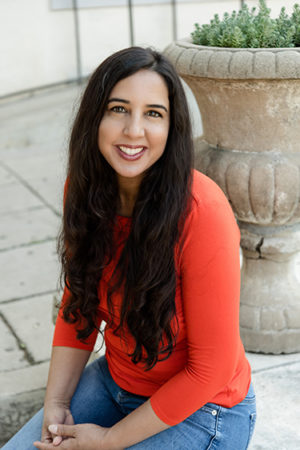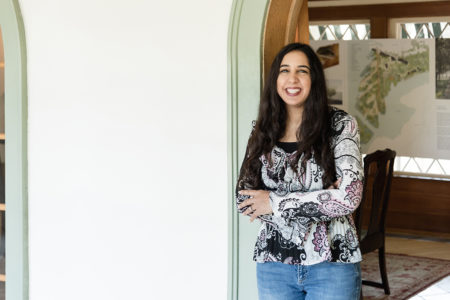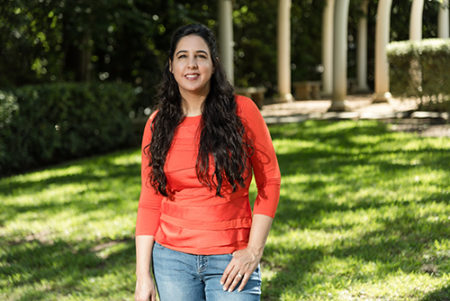Lila Igram, founder of the global crowdfunding platform Connecther, shows what powerful, impactful changes are possible when we start to consider all the women in the world as friends, as family—and as one.
By Clarisa Ramirez , Photos by Dustin Meyer
Shot on location at Laguna Gloria, 3809 W. 35th St., thecontemporaryaustin.org
 Lila Igram is undeniably hospitable.
Lila Igram is undeniably hospitable.
“Would you like a gumball?” she asks, pointing to a slender package of colorful orbs resting on her desk. “I love them.”
In her humble, tidy office, there are two simple desks facing each wall, one for her and one for visitors. She is loquacious, curious and all smiles as she walks room to room in her house slippers, giving a quick tour of her workspace in the Westview Canyon home she and her husband built when they moved to North Austin two decades ago.
At 50, Igram appears to be a woman in her mid-30s. Her style is effortless and natural and she wears barely a stitch of makeup. Only a couple gray hairs poke through her long, cascading, dark-brown hair.
Igram is the founder and executive officer of Connecther, a communication and crowdfunding platform focused on advancing the lives of impoverished women and girls worldwide. Through a fundraising platform, her largely volunteer-driven organization connects already-formed nonprofit partners in the Middle East, South Asia, Africa and North America with donors who search for what they want to fund on connecther.org. The projects—ranging from training midwives in Somalia to funding a girls’ soccer team in Malaysia to bringing clean water to the children of Palestine—are fueled by leaders on the ground. Connecther also organizes the Girls Impact the World Film Festival, an initiative that provides an outlet for youth to tell stories about the critical issues facing women and girls in their own communities. To date, the festival has received more than 1,000 short films and has provided more than $25,000 in scholarships to high-school- and college-age students each year. Celebrity judges from festivals past included former model and humanitarian Christy Turlington Burns, movie producer Jeff Skoll and musician Michael Einziger.
Igram’s work keeps her incredibly busy. A typical day involves sending emails to partners, meeting with donors and communicating with people throughout the world who keep the wheels moving at Connecther. In July, she and her board members are set to have a strategic-planning session about extending the two-hour film festival to a full-day event with workshops. They’ll also discuss how to best grow the organization’s Girls Global Education Fund and how to incorporate the films coming out of the GITW Film Festival into curriculum intended for teachers to use in schools.
“I can’t wait to get everyone in the same place at one time and discuss our goals,” Igram says of her impending team meeting.
It’s been six years since Igram launched Connecther, and she’ll be the first to admit her unwavering enthusiasm for the job has her working late nights while her family is watching TV. On a typical Friday, she’s frustrated because she can’t get enough work done.
“I love the work that I do, so just researching is fun to me. But I have to wait all the way until Monday to get responses to emails,” she says. “Sometimes I just get so excited being at my laptop and I’ll send out emails but, oh, [I’ll remember] it’s a Friday! It’s like, ‘What am I doing?’ It doesn’t even make any sense because nobody is going to reply.”
Although it can be a challenge for Igram to turn off work, she ascertains her family remains her top priority. She enjoys traveling, going on trail walks and watching movies with her husband, Tarik, and her three children, Zak, 24, Noah, 22, and Mena, 19. If the line between her work and family life ever blurs, Igram justifies it’s because her family is a constant source of mentorship and inspiration for Connecther. Zak’s involvement with the Harvard Men Against Rape campaign, for example, prompted Igram to add a Stand Up Men award to this April’s GITW Film Festival, an honor that celebrates stories about men who are standing up for women’s and girls’ rights.
Connecther’s vision to elevate the status of women and girls everywhere is deeply rooted in Igram’s sense of identity and growing up as a Muslim woman in Cedar Rapids, Iowa. As the daughter of entrepreneurial Lebanese immigrants, Igram represented one of the few minorities at her school. “I grew up in a place where my voice wasn’t really represented,” she says. However, outside her larger community was a smaller yet more diverse one. Every week, she and her family attended a mosque that represented more than 80 different ethnicities. It opened Igram’s eyes to the spectrum of people who shared her faith.
“To get the chance to create opportunities on a platform for people to authentically represent themselves was really important for me,” Igram says. “It kind of gives you a chip on your shoulder, especially when you see people in the media talk about your religion and your background when they have no direct experience with it. And everything they’re saying is not the reality of the people I know and the diversity of my community and the people I’m surrounded with.”
Igram and her immediate family moved from Iowa to Austin when her husband, Connecther’s first sustaining donor, received a job offer from Dell. Igram had been a stay-at-home mom for several years, dabbling with a few business ideas before finding her calling. Prior to being a mom, she had studied economics at the University of Iowa, but says her heart just wasn’t in it.
“I’ll tell you straight out: It was hard for me to stick to things,” Igram says. “When my kids were younger, I was gung-ho about a few projects, but mostly, everything would last three or six months. With Connecther, it was 100 percent different. I have to believe in what I do. I have the luxury to be able to do that, but even if I didn’t, I’d be a bum on the street before I did something that goes against my grain.”
Igram attributes Fast Company magazine with sparking her passion for philanthropy. She started subscribing to the magazine when it came out in 1995, and says those earlier issues highlighted and profiled a ton of social entrepreneurs.
 “I read every single issue,” Igram confides. “At that time, I definitely wanted to do something that had an impact. If anything got me fired up and passionate, [it]was reading those stories, not just about the people, but of the impact they were having in the world.”
“I read every single issue,” Igram confides. “At that time, I definitely wanted to do something that had an impact. If anything got me fired up and passionate, [it]was reading those stories, not just about the people, but of the impact they were having in the world.”
In 2005, Igram started volunteering with Flow (now called Conscious Capitalism Inc.), a nonprofit dedicated to “liberating the entrepreneurial spirit for good” that was started by Whole Foods Co-founder John Mackey and educational entrepreneur and consultant Michael Strong. A year later, she was hired as the organization’s community-outreach and programs coordinator, working at Flow until 2008. Igram credits her capability to start a nonprofit to the woman she worked most closely with during that time, Phyllis Blees, who served as the nonprofit’s vice president.
“She was over-the-top meticulous about documentation and making sure everything was filed properly,” Igram says of Blees. “I learned so much about nonprofits [from her]. When I left Flow and started Connecther, I had all the skills.”
After Flow, Igram spent the next few years helping a doctor start up her practice in Austin, but the idea for Connecther started to percolate. Igram first had the idea to create the global, female-focused crowdfunding platform while she was working on a program at Flow called Empowering Women Entrepreneurs. Taking the idea off the back burner, Igram started educating herself and attending social-impact conferences, meeting women from throughout the world who were doing amazing things, and following up to ask them if she could invest in what they were already doing.
Igram’s approach was simple. Connecther was a way to share women’s stories with people from throughout the world so they could get a variety of perspectives on the reality of a woman’s unique situation. In other words, she wanted to show that a woman living in Syria faced a different set of obstacles than, say, a woman living in Egypt.
Starting the nonprofit was easy, Igram says with a tone of determination. It was coming up with a purpose she was passionate about that was a challenge. She started thinking about her roots, growing up with a mother who was raised in a village in Lebanon, and thought about how to best represent marginalized people who don’t have the same opportunities as those living in developed countries but are still capable of helping themselves.
“Naturally, what came to me is: Why don’t we identify women who are on the ground and are from the communities that we are trying to help, women who actually understand the culture, community and religion, and have a vested interest in making sure a project thrives because they’re from the communities?” she says.
This sense of responsibility creates sustainability in the community, Igram explains, because the next generation will be able to move forward and cite a history of successes.
The first step for Connecther was to identify leaders in local communities who had already founded grassroots organizations.
Igram bootstrapped Connecther by getting as many in-kind services as possible, knocking on several doors before someone agreed to create graphic design for Connecther’s website pro bono.
In 2011, she launched Connecther with half a dozen projects on the website. Now the group focuses on funding a dozen projects a year. Although the platform initially focused on projects overseas, Igram recently started working with local nonprofits, including She is Rising, which helps survivors of sex trafficking.
A year after launching, in 2012, Igram had the idea for Connecther’s GITW
Film Festival.
“I watched a film that a girl produced for college about education for women and girls, and I was obsessed!” she exclaims, her eyes widening as she recalls how the film stirred up some strong emotions. “I was like, ‘Woah! What if we could get students from all over the world to do these films?’ ”
At the time, Igram had an intern working for her, Kerry Hammond, a student at Harvard. Igram had her watch the film and told her about the idea to start a film festival. Convinced and on board, Hammond recruited a couple other Harvard students, Ara Parikh and Kara Kubarych, to help get the festival off the ground. The trio formed a partnership with the Harvard College Social Innovation Collaborative, a program still deeply involved with Connecther, and Igram reached out to influential partners about being judges, including Liberian Nobel Laureate Leymah Gbowee and Zainab Salbi, founder of the grassroots humanitarian organization Women for Women International. Almost all of them said yes.
The first red-carpet screening for the film festival took place in February 2013 on the Harvard University campus. It was a huge success, Igram says, thanks to the buzz produced by the festival’s celebrity judges. The festival received more than 100 short films produced and directed by girls from throughout the world, all of which highlighted issues related to advancing women’s and girls’ rights. Since then, Connecther has scaled the festival, securing sponsors and creating themes for entries that address education, economic independence, global health and violence against women. This year was the first time Connecther hosted the festival on home turf at St. Andrew’s Dell Fine Arts Center in Austin, a welcome and rewarding move, seeing how the festival received more than 200 film submissions from 20 different countries and saw 400 people attend—almost double the audience of the event’s first year.
 Connecther’s emphasis and focus for the festival is to showcase stories from people who have a deep relationship with their subjects, stories that aim to promote awareness and make a direct impact. The short films must be watchable, but there’s more weight on the story itself than on the film’s production value.
Connecther’s emphasis and focus for the festival is to showcase stories from people who have a deep relationship with their subjects, stories that aim to promote awareness and make a direct impact. The short films must be watchable, but there’s more weight on the story itself than on the film’s production value.
“The whole reason we even started the festival in the beginning was to elevate these stories on a more global level,” Igram says, referencing a documentary called Harvesting Hope that Sarah Jehaan Khan, a teenager in Pakistan, submitted when she was 16 years old.
In 2014, it won the Green IS first-runner-up award, which is granted to films with an environmental focus. The film centers on how the cotton industry in Pakistan is relegated to women, and because of the use of harmful pesticides, the cotton pickers suffer disproportionately from health concerns, ranging from skin rashes to miscarriages. In the film, Khan interviews women who work on an organic cotton farm and are saving money they should be spending on medicine. After the festival, Khan was invited by the Asian Development Bank, the biggest development bank in Asia, to screen her film at a conference in Colombo, Sri Lanka. Surrounded by lawyers and policy makers, Khan was the youngest presenter at a judicial round-table session focused on how environmental factors affect women. Several of the judges cried while watching her film.
“I learned about the power of stories and the power a film can have to influence policy,” Khan says of her foray into filmmaking. “A high-court judge said she was willing to take up a petition on behalf of the girls in the film in attempt to restrict chemical pesticides.”
Getting a law passed in Pakistan is a long and difficult process, Khan acknowledges, but she was happy to inspire others to take the first step. Since then, Khan has won the Green IS prize for another film, The Ripple Effect, and is currently working on a submission for the 2018 festival. Each year, Igram pushes to innovate and bring something new to Connecther. In the past few years, the organization has begun creating more projects with the GITW Film Festival submissions, projects that have the promise to make a significant social impact. Take, for example, the film Asma, which won the Judges’ Choice first-runner-up prize in 2016. Igram loved the film, which documents a day in the life of Asma, a 13-year-old tea seller in Bangladesh whose childhood has been sacrificed to support her family. The film’s producer, Pooja Khati, documents Asma working at her family’s tea shop from 5 a.m. until midnight.
As Igram describes the setting, her voice quavers.
“In the film, Asma is saying, ‘When is my dad going to send me to school? I want to study. Those who study have importance.’ ”
The film was so powerful, a donor decided to provide the seed money for Connecther’s Girls Global Education Fund. In partnership with the Asian University for Women, the fund provides scholarships to students in need who are living in the Middle East, Southeast Asia and Africa. Asma was the first scholarship recipient through the fund and, thanks in part to that donor, she’s now going to school every day.
However, funding the project wasn’t simple. Asma started going to school, but Asma’s father sent her back to work at the tea shop soon after a boy who replaced her stole the shop’s money. Connecther Program Director Azmina Karim, a former GITW Film Festival winner based in Bangladesh, manages the Global Fund for Girls Education and told Igram that Asma’s father had broken the agreement to send Asma to school. Igram’s response was not to pull the plug on the relationship, but rather to be understanding and patient. “She said, ‘Talk to him. Is there a way we can convince him to recruit someone else and show him that she needs to be there?’ ”
Karim says, recalling her conversation with Igram. “I think that shows her ability to see situations out of the box and, at the same time, be respectful of other cultures.”
Karim adds that she admires how Igram rejects being a savior figure, and that Connecther, unlike many other agencies, doesn’t have any strings attached with its funding.
“Lila is not someone who is leading the team, but is moving along with the team. She understands that we can make the most [of a situation]when we work together on the same issue,” Karim says. “[She] recognizes that the people we work with have an equal contribution and are capable of making decisions themselves.”
After Karim talked to Asma’s family, Connecther made some adjustments to the agreement and decided to offer the family a stipend that provides them with the same amount of money Asma was making at the tea shop.
“That’s why it’s so important to work with local partners on the ground,” Igram says of the situation with Asma. “If we didn’t have that, it’s not going to happen.”
She follows up with a short email on the subject a few days later.
“Some organizations might have scoffed at the father and possibly have tried to rush or impose the scholarship, or just drop it altogether,” she says, “but that is not our approach. We are trying our best to create sustainable relationships, which means working with all of the families to make sure we do it right, and find what works for each family in order to create lasting impact.”
In 2016, Connecther generated $200,000 in revenue. Igram says the organization is on track to surpass that amount by 20 percent in 2017. The bulk of Connecther’s revenue comes from the Stahl Family Foundation; the Ian Somerhalder Foundation; JP’s Peace, Love & Happiness Foundation; Connecther Gems, two dozen supporters who donate at least $100 a month to Connecther; and crowdfunding projects spearheaded by other donors.
 Since Connecther only has three employees, Igram relies on a family of volunteers, contractors, collaborators and donors to help her accomplish the platform’s mission. Last year, Connecther added 15 chapters in Asia and the U.S., including one at St. Stephen’s Episcopal School in Austin. The chapters host screenings of Connecther films and work on fundraising for projects. The organization is advancing and innovating, but Igram remains humble, crediting her team for the success they’ve seen so far. She’s mindful about who she brings into her circle, looking for people she vibes with instead of those who can grow the organization. She seeks out those who apply the same life practice of leading with compassion that she learned from her father, a man, Igram says, who always forgave any debt owed to him. She wants to surround herself with people who are really committed and believe in the mission so much, they want the same results she does.
Since Connecther only has three employees, Igram relies on a family of volunteers, contractors, collaborators and donors to help her accomplish the platform’s mission. Last year, Connecther added 15 chapters in Asia and the U.S., including one at St. Stephen’s Episcopal School in Austin. The chapters host screenings of Connecther films and work on fundraising for projects. The organization is advancing and innovating, but Igram remains humble, crediting her team for the success they’ve seen so far. She’s mindful about who she brings into her circle, looking for people she vibes with instead of those who can grow the organization. She seeks out those who apply the same life practice of leading with compassion that she learned from her father, a man, Igram says, who always forgave any debt owed to him. She wants to surround herself with people who are really committed and believe in the mission so much, they want the same results she does.
“I’m not a big loyalty person. I’m more of a freedom person. If you trust someone, she’ll get the job done,” Igram says.
When discussing Igram, the women in the Connecther family bring up glowing character qualities to describe how they feel about her: She’s a good listener. She’s fair. She’s inclusive.
Igram makes a point to maintain contact with all of Connecther’s donors, recipients and the alumni who’ve been associated with the film festival, and it’s her relationship-building skills that make it easy for her to approach more influential people about getting involved with Connecther.
“She’s just really interested in having a genuine relationship with people, whether it’s [Twitter Co-founder] Biz Stone or me,” says Constance Dykhuizen, the director of JP’s Peace, Love & Happiness Foundation.
Dykhuizen first met Igram in 2013 at South By Southwest and has been working closely with her ever since Eloise DeJoria (the wife of JP’s Peace, Love & Happiness Foundation Co-founder John Paul DeJoria) got involved four years ago as the GITW Film Festival’s presenting sponsor. The film festival, Dykhuizen says, is an expression of who Igram is and how she lives her life. The fact that Igram has chosen, thus far, to work from home, welcoming visiting volunteers to use the second desk in her home office, couldn’t be more symbolic of how tightly knit Connecther is with her own family. Igram pauses to reflect on this observation and chooses her words carefully. “What better way to live your life,” she asks, “than to incorporate all of [your]values in everything you do?”


